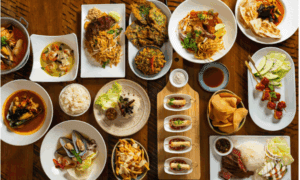Introduction
In the dynamic and competitive realm of the hospitality industry, the roles of a Food and Beverage (F&B) Manager and a Restaurant Manager are crucial in ensuring the seamless operation of an establishment. While the titles may sound interchangeable, they encompass distinct responsibilities, skill sets, and areas of focus. In this comprehensive guide, we will delve into the nuances that set these two managerial roles apart, shedding light on their unique contributions to the success of a dining establishment.
1.Understanding the Roles:
A. Food and Beverage Manager:
Overview:
The food and beverage manager holds a pivotal position in the hospitality sector, overseeing the entire F&B department within an establishment. This encompasses not only the restaurant but also bars, lounges, catering services, and any other areas associated with food and beverage operations.
Responsibilities:
The core responsibilities of a food and beverage manager include:
a. Menu Planning and Development: Collaborating with chefs to create enticing and profitable menus that cater to the target audience.
b. Inventory Management: Efficiently managing and controlling the stock of food and beverages to minimize waste and maximize profitability.
c. Supplier Negotiations: Establishing and maintaining relationships with suppliers to ensure a steady and cost-effective supply chain.
d. Quality Control: ensuring that all food and beverages served meet the established quality standards and comply with health and safety regulations.
e. Staff Training and Development: Providing guidance and training to the F&B staff to enhance their skills and deliver exceptional service.
B. Restaurant Manager:
Overview:
The restaurant manager, on the other hand, is primarily focused on the day-to-day operations of the restaurant itself. This role revolves around creating a positive dining experience for customers while maintaining the restaurant’s financial viability.
Responsibilities:
The key responsibilities of a restaurant manager include:
a. Front-of-House Operations: Overseeing the host/hostess, servers, and other front-of-house staff to ensure smooth and efficient service.
b. Customer Satisfaction: Ensuring a high level of customer satisfaction by addressing complaints, resolving issues, and maintaining a welcoming atmosphere.
c. Financial Management: Monitoring and managing the restaurant’s budget, controlling costs, and implementing strategies to maximize profitability.
d. Marketing and Promotion: Collaborating with the marketing team to develop and execute promotional strategies to attract and retain customers.
e. Compliance: ensuring that the restaurant complies with health and safety regulations, licensing requirements, and other legal obligations.
2. Skills and Qualifications
A. Food and Beverage Manager:
To excel in the role of a food and beverage manager, individuals typically need:
a. Culinary Knowledge: An understanding of culinary trends, techniques, and a passion for food.
b. Financial Acumen: Strong financial management skills to handle budgets, pricing, and cost control effectively.
c. Leadership Abilities: The ability to lead and inspire a diverse team of kitchen and service staff.
d. Communication Skills: Effective communication skills to liaise with suppliers, staff, and other departments.
e. Problem-Solving: Quick and effective problem-solving skills to address issues promptly and maintain operational efficiency.
B. Restaurant Manager:
a. To succeed as a restaurant manager, individuals usually need:
b. Customer Service Skills: exceptional interpersonal skills to ensure a positive dining experience for customers.
c. Business Acumen: A keen understanding of business operations, financial management, and marketing strategies.
d. Leadership and Team Management: The ability to lead and motivate a team, fostering a collaborative and positive work environment.
e. Adaptability: flexibility to handle diverse challenges that may arise during day-to-day operations.
f. Time Management: Effective time management skills are needed to juggle multiple tasks and responsibilities.
3. Collaboration and Interdependence
While the roles of food and beverage manager and restaurant manager differ in focus, successful establishments recognize the need for seamless collaboration between these positions. A harmonious relationship between the F&B manager and the restaurant manager is vital for the overall success of the business.
A. Communication and Coordination:
Open and transparent communication between the two roles is crucial. Regular meetings and updates ensure that both managers are aligned with the overall goals and objectives of the establishment.
B. Cross-Training Opportunities:
In some cases, cross-training staff between the kitchen and front-of-house can enhance understanding and collaboration. This approach allows employees to gain insights into different aspects of the business, fostering a more cohesive team.
4. Career Paths and Advancement:
Understanding the distinctions between the roles of food and beverage manager and restaurant manager can guide individuals in choosing the right career path within the hospitality industry. Additionally, recognizing the skills and experiences required for each role can help professionals plan their career advancement effectively.
A. Career Progression for Food and Beverage Managers:
Food and beverage managers can advance their careers by:
a. Specialization: developing expertise in specific areas such as wine, mixology, or international cuisine.
b. Multi-Unit Management: Taking on responsibilities for overseeing multiple F&B outlets within a hotel or restaurant group.
c. Executive Roles: Progressing to executive positions such as Director of Food and Beverage or Vice President of F&B Operations.
B. Career Progression for Restaurant Managers:
Restaurant managers can advance their careers by:
a. Multi-Unit Management: Overseeing the operations of multiple restaurants within a chain or group.
b. Regional or District Management: Taking on broader responsibilities for managing a region or district of restaurants.
c. Ownership or Entrepreneurship: Pursuing entrepreneurship by owning or managing their own restaurant.
d. Executive Roles: Progressing to executive positions such as Director of Operations or Chief Operating Officer within a restaurant group.
Conclusion
While the titles of Food and Beverage Manager and Restaurant Manager may sound interchangeable, the responsibilities, skills, and career paths associated with each role are distinct. A successful dining establishment requires a harmonious collaboration between these managers to ensure both the back-of-house and front-of-house operations run seamlessly. Understanding these differences can guide aspiring professionals in choosing the right career path and help current managers excel in their roles, contributing to the overall success and longevity of the hospitality business.



































